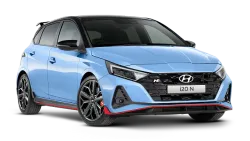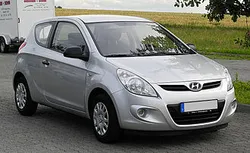

Hyundai i20 Generation 1 Overview
Explore the Hyundai i20 generation 1 features and specifications. Discover how this model has evolved, highlighting its significance in the automotive market, especially in Portugal.
The Hyundai i20 Generation 1, launched in 2008, marked the South Korean manufacturer's foray into the highly competitive subcompact segment. As a successor to the Hyundai Getz, the i20 was designed to offer a blend of s...
Technical Specifications
Select Version
Dimensions
Engine
Driving
Others
History and Features
Mycarro AI
Apr 26, 2025
The Hyundai i20 Generation 1, launched in 2008, marked the South Korean manufacturer's foray into the highly competitive subcompact segment. As a successor to the Hyundai Getz, the i20 was designed to offer a blend of style, functionality, and modern technology. With its debut, Hyundai aimed to attract a younger audience while maintaining affordability and reliability, key pillars that formed the foundation of the brand’s philosophy.
Design and Aesthetics
The first-generation i20 showcased a more refined and contemporary design compared to its predecessor. Its fluidic sculpture approach provided a dynamic appearance that appealed to younger buyers. The exterior features distinctive creases and sharp angles that help it stand out in a crowded market. The front fascia, characterized by its large hexagonal grille and prominent headlights, conveys a sense of boldness. At the same time, subtle details like the rear LED taillights contribute to its overall allure.
Inside, the i20 continued the theme of modernity with a spacious and well-designed cabin. Quality materials and finishes were an improvement over previous models, with a user-friendly dashboard layout that enhanced the driving experience. A significant highlight of the interior was its ample cargo space, offering practicality that appealed to families and students alike. The incorporation of features such as air conditioning, Bluetooth connectivity, and a quality sound system further emphasized Hyundai’s commitment to providing value.
Performance and Engine Options
Under the hood, the i20 Generation 1 offered a range of engine options to cater to different driving preferences. Buyers could choose between a 1.2-liter petrol engine and a 1.4-liter diesel unit, both of which were designed for efficiency and sufficient power for urban driving. The 1.4-liter petrol variant came with an automatic transmission option, signifying Hyundai’s understanding of evolving consumer demands. The car was celebrated for its smooth ride quality, compliant suspension, and agile handling, which made it a popular choice for city dwellers.
With fuel economy being a crucial factor for buyers in this segment, the i20 did not disappoint. Both petrol and diesel variants were engineered to deliver impressive mileage figures, a significant selling point during its launch. This focus on efficient driving coupled with the youthful design made the i20 a favored option among environmentally-conscious drivers seeking an economical choice without compromising on style.
Safety Features
Safety was another aspect where the i20 Generation 1 excelled. The vehicle scored well in various safety assessments, and Hyundai equipped it with numerous safety features that were quite advanced for its time. Standard offerings included dual front airbags, ABS (anti-lock braking system), and child safety locks. The robust safety framework established the i20 as a trustworthy option for families, further enhancing its appeal in the competitive subcompact sector.
Hyundai's commitment to safety and technology continued with features such as advanced braking systems and reinforced body structures. The vehicle's performance in crash tests helped solidify its reputation as one of the safer choices in its class, providing more assurance to potential buyers.
Market Impact and Reception
Upon its launch, the Hyundai i20 Generation 1 garnered positive reviews from automotive critics and buyers alike. The successful combination of stylish aesthetics, ample interior space, solid performance, and safety features contributed to its widespread appeal. Its affordability compared to competitors like the Ford Fiesta and the Honda Jazz helped bolster sales numbers across various global markets.
By the time the first-generation i20 was phased out in 2014, it had established itself as a significant player in the subcompact market, laying a solid foundation for Hyundai's subsequent generations. The i20 demonstrated the brand's ability to innovate and adapt to consumer needs, echoing a shift in perceptions about non-European manufacturers in this segment.
Conclusion
The Hyundai i20 Generation 1 represents a pivotal point in the company’s history. By elegantly balancing modern design, functional features, and safety, the i20 appealed to a demographic eager for an affordable yet stylish vehicle. As it set the stage for the future iterations, the first-generation model established Hyundai's position as a key competitor within the subcompact car market, paving the way for continued success in the years to come.
